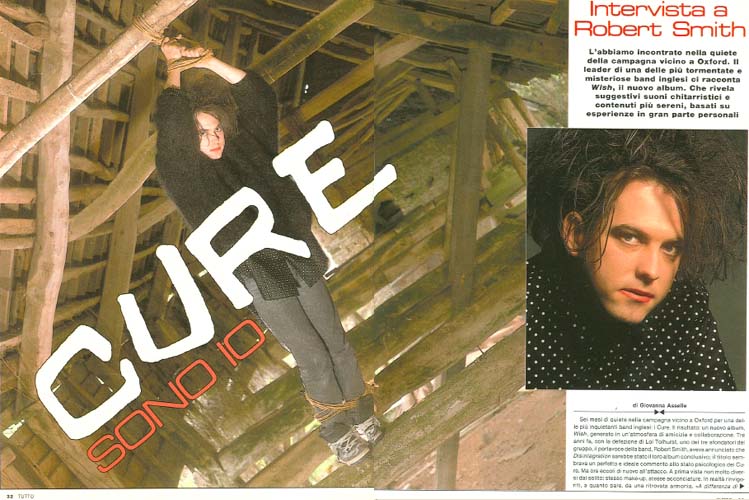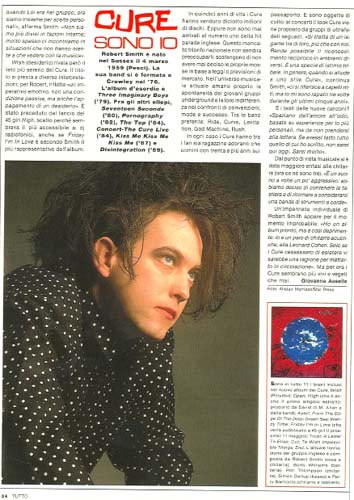Interview with Robert Smith - Interview / by Giovanna Asselle


1992 Tutto (Italy)
(Translation Below)*
Interview with Robert Smith -
Interview /
by Giovanna Asselle


Interview with Robert Smith
We met with him in the peaceful countryside outside Oxford. The leader of one of
the most tormented and mysterious English bands tells us all about "Wish", the
new album. Which reveals evocative guitar sounds and lighter contents, based on
mostly personal experiences
by Giovanna Asselle
Six months of quietness in the Oxford countryside for one of the most disturbing
English bands: the Cure. The result: a new album, "Wish", born in an atmosphere
of friendship and collaboration. Three years ago, with the departure of Lol
Tolhurst, one of the three founder members of the group, Robert Smith had
announced that "Disintegration" was going to be their last record; the title
seemed a perfect and ideal commentary to the psychological state the Cure were
in. But now here they are again. At a first glance they're not so different from
usual: same make-up, same hairdo. But actually strengthened, it seems, by a
refound
harmony.
Differently from when Lol was in the band, now we're together for personal
choices, says Smith. We're not divided in internal factions; we often meet in
completely music-unrelated occasions.
But Wish reveals the most tranquil side of The Cure. The title suits many
different interpretations; as for Robert, it shows an emotive imperative, not a
passive condition, but also the satisfaction of a wish. It was preceded by the
7" "High", chosen because it seemed the most accessible to radio
DJs,
even if "Friday I'm In Love" is according to Smith the most representative of
the album.
In 15 years of music the Cure sold 18 million records. And yet they never
reached the number one spot in the UK Top 10. This missing homeland achievement
doesn't seem to bother them; they claim they've never decided their moves
according to market laws or forecasts. In the actual musical universe they love
the spontaneity of young underground groups and their indifference towards
conventions, fashions and success. Among the
favorites:
Ride, Curve, Levitation, God Machine, Rush.
The Cure have as their fans both screaming teenagers and 30 or more years old
men. And they have a cult following: in concerts, the Cure look is showed by
ultrafaithful
groups of followers. It is more a bond between them, than with us. It makes it
possible to recognize themselves in different places. It's like a tribal
instinct. Usually, when you refer to Cure style, says Smith, you refer to long
hair standing on end; but I cut my hair three times in the last five years.
And the new songs' lyrics? They range from love to hate, based on experiences
mostly personal, but not to be taken literally. If I had done everything I
wrote, I wouldn't
be here today. I'd be dead.
From
the musical point of view a greater emphasis
to guitars has been given (now
there are three of them): It is a sometimes more aggressive sound: we decided to
keep the keyboards down and go back to considering us a guitar band.
And individual rise by Robert Smith seems unlikely right now: I have an album
ready, but it's really depressing: me and two acoustic guitars, à la Leonard
Cohen. Only if the Cure would cease to exist there would be a reason to release
it. But for now the Cure seem more alive than ever.
by Giovanna Asselle
Thanks so much
PIETRO
for TRANSLATING.